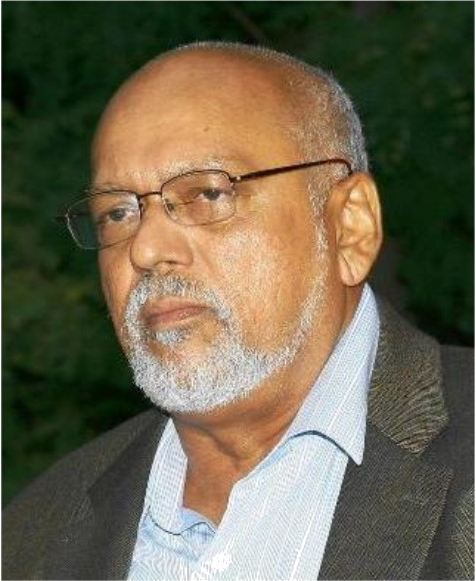“Indian-Nationalists despised Cheddi Jagan for not pursuing a racist political line” (SN Mar 6), claimed Donald Ramotar. He erred! I commend the former President for his patriotism and nationalism and his role in combating election riggings to which he referenced Mr. Hamilton Green whose political history in elections and government is well known.
Profs Clem Seecharan and Baytoram Ramharack were referred to as Indian nationalists. I can’t speak for them on ethnic nationalism or identity affiliation and their politics. They have been Guyanese nationalists. I don’t know of Seecharan being ‘an Indian nationalist’. He was not known to have penned anything promoting or defending strictly Indian or Hindu issues or appealing on Indianism. He was a Jaganite and supported the left wing PPP and also partook in the struggle against election riggings that denied victories to the Indian-based PPP. Does that make him an Indian nationalist?
Ramotar and other critics of Seecharan should read the book before critiquing it. It’s a complex and comprehensive study in which he examines why Cheddi lost the game to Burnham although he had all the trumps in his hand. It is based largely on Jagan’s voluminous writings over nearly 50 years, colonial documents, and some MI5 files. Independence was there for the taking, but Cheddi blew it. Seecharan argues that from the beginning of Cheddi’s political career he was a communist who believed that the Soviet Union was setting the example for the universal liberation of humankind. Despite this, by 1960 the British were all set to give Cheddi independence, but he decided that Castro’s Cuba vindicated the Soviet model as applicable to the Caribbean. The British Labor Party and the Communist Party even resisted the Americans for some time, but Cheddi’s loyalty to Castro (he visited Cuba twice in 1960, and declared Castro ‘the greatest liberator of the 20th century), was a dangerous stance to take in the context of the Cold War. And when he met Kennedy in October 61, he left the President in no doubt that he was on the side of the Soviet Union. Cheddi consciously decided to support the Soviet Union against the US. He was a partisan of Soviet communism; he was proud of it. That’s why he was left in the wilderness for 28 years because of it.
Burnham was virtually dead politically, after the 1961 General elections. It was Cheddi’s lack of statesmanship and his understanding of geo-politics that made it possible for LFS to be resurrected from the dead. Cheddi genuinely believed that the Soviet mantra was of universal validity; that it was shaping a new man, and that it was winning all over the world.
Clem’s book is no defender of LFS either. Clem documents LFS’s understanding and practice of realpolitik, his dictatorial frame of mind, and his relentless pursuit of power from the inception, in the early PPP – and his rigging of elections. Clem also explains why LFS claimed to adopt a form of Marxism after 1974, arguing that it gave him a rationale to propound and adopt ‘the paramountcy of the party’ as advocated by Marxist-Leninist regimes universally. Besides, the latter was meant to undermine Cheddi’s crusade for free elections as if it was a liberal democratic society. It’s a study that is in now way celebratory of LFS’s rule.
Seecharan is an award-winning historian, and possibly the most prolific contemporary Guyanese historian. He has written extensively on Indo-Guyanese history in the colonial period, as well as on the history of West Indies cricket, including a 4-vol history of cricket in Guyana (2 vols published so far).
Ramotar is clearly unfamiliar with Clem’s highly acclaimed works where he celebrates Indo-Guyanese achievement in diverse spheres, but he does not advocate Indian economic or political domination. He also celebrates African Guyanese and West Indian achievement in several of his works, including their pioneering intellectual work in the region. He is no Indian nationalist, as Ramotar claims.
It is therefore wrong to relegate a substantial body of Clem’s scholarly work as being warped by racial prejudice or a petty Indian nationalist agenda. This is a disservice to an eminent scholar.
Same can be said of Prof Ramharack who fought against racism and racial persecution experienced by Indians and for Indian equality, and he also championed free and fair elections from 1977 onwards. He, myself, and others founded a group in 1977 that was dedicated to the struggle for the restoration of democracy in Guyana and combating human rights violations. The Indian supported PPP became and still is a beneficiary of that long struggle that led to free and fair elections. It was Dr. Jagan who claimed that Indians were victims of racism in Guyana during the dictatorship, and it was he who labeled the dictatorship as an apartheid system. Why then is Ramharack, myself and others excoriated and derogated for combating the intense racism and cultural marginalization experienced by Indians?
Why is being an Indian nationalist problematic for Ramotar? And is ours different from Afro nationalism? Which African leader or rights activist was or is not an ethno-nationalist? Afro nationalism is a response to Indian nationalism and vice versa. Does being an ethno-nationalist mean that one is prejudiced against other groups or anti-working class? Can’t one be an Africanist and still respect Indians and vice versa. Can’t one be Christian and still have tolerance and respect for a Hindu or a Muslim and vice versa? Ethno nationalism, pride, and affirmation in one’s cultural and or physical identity (roots), has become institutionalized in Guyanese way of life going back to the period of slavery and indentureship. Drs. Seecharan and Ramharack and those Indians who sought to influence Jagan from the mid-1940s thru 1990 did not invent it. It inheres in the society. It defines each of the groups in the nation. One can blame the White man for creating it under its divide and rule strategy, but it has remained a realty in our society. Politics became ethnicized in 1955 onwards and has remained so till this day. In fact, an argument was made that ethno nationalism was the main cause of the riggings experienced between 1966 and 1992 and the attempted rigging of 2020. As Green hinted, the African PNC could not win an elections. So it resorted to rigging.
I do not know of any Indian who sought to put “Indians pon top”. Most certainly not Seecharan and Ramharack! They both, as did I, Ravi Dev and others, advocated for “power sharing” (to be defined inclusive of devolution of power) between and among the different ethnic groups and classes. There is no oral or written evidence from any Indian nationalists from the 1950s thru the 1990s advocating racial domination by Indians. They appealed to Jagan to abandon communism so that the West would not turn against Indians. Ethnic domination was de facto rule between 1965 and 1992.
I don’t know of any Indian nationalists who voiced hate for Jagan. Their appeal to Jagan to move away from communism did not mean they despised him. On the contrary, they cared for and loved him and the Indian community and as such the plea to embrace the West rather than the Soviet bloc.

Indian nationalists “did not praise Burnham for his siding with the British and American”. The Indian nationalists sought their own support from the British and Americans, but they were unsuccessful, as Ramotar pointed out, in getting Indian support in the 1964 elections. Balram Singh Rai, for example, appealed to Indians for support to win seats so he could negotiate on their behalf for power (control of key Ministries). He was rejected (as was Hoosein Ghanie of the Muslim Party) and Indians were left powerless and hapless after Burnham took power .
Ramotar writes that the working class of all races have been pauperized. Whose fault was it? Two socialist parties governed between 1957 till now — 66 years. What did Ramotar and his party do to empower the working class? The wealthy beneficiaries of governance were not and are not Indian nationalists. There is hardly any wealthy Indian businessman (except a Muslim family) who has consistently supported Indian causes or Indian culture. And that Muslim family, from media reports, generously donates to all groups.
Ramotar claims that Indian-Nationalists worked hard to push the PPP on a racist path as Burnham. I know of no wealthy Indian who expressed hate for the working class and who advocated racism as an ideology to replace communism. Cultural nationalism yes! Nationalism (pride in identity) must not be equated with racism (hatred for those not of one’s ethnicity). I know of several businessmen and apparathiks who were with the PNC up until 1992 and when their party lost power, they switched over the PPP; they have been embraced while those who combated discrimination are waiting outside at the gate.
I agree with Ramotar that Jagan was a Guyanese nationalist; he did not harbor racism or had a racist cell. He was an honorable patriot and honest. His misunderstanding of global and geo-politics landed him in trouble and by extension the exclusion of his supporters from power. I also agree that Jagan had fought for racial and working class unity. But he was not successful as the country has remained racially divided as when he arrived in 1944 and when he died in 1997. As Ramotar himself pointed out, in spite of the despair of Guyanese between 1965 and 1992, Africans still voted for PNC in 1992 and have remained loyal to the PNC till this day. In spite of his errors, Jagan must be given his due for his struggle favoring the working class empowerment.
Ramotar is right that the solution to our racialized politics is cross-racial unity. But unity is not achieved by simply calling for it. We have been trying for racial unity since 1953 without success. Even Ramotar tried in 2011 elections and was rejected, and he doled out more resources to Africans, Mixed, and Amerindians than on Indians during his tenure. Yet, in 2015, he was rejected by Africans and Mixed races. Angry Indians voted against him for his policy of ‘racial appeasement’. The question then is how do we achieve cross racial unity?
I remind Ramotar that Lenin and Stalin created ethnic homelands for the dozens of nationalities in the USSR. If ethnicity was not salient, why the need to create homelands for each nationality? Marx stated that ethnicity (nationality) is but an epiphenomenon of the class struggle and will disappear in the communist phase of development. After seventy years of communist rule, ethnicity remained very strong in the Soviet Union and was a factor in its dissolution by Gorbachev. The socialist republic of Yugoslavia was dissolved in seven ethnic republics and there have been ongoing ethnic wars for independence of other nationalities. Socialist Guyana can’t resolve ethnic conflict after seventy years. The socialist republic of Venezuela claims territory of the socialist republic of Guyana. And other socialist nations in Latin America have also been engaged in conflict of a nationalist nature. What is the magic bullet to end ethnic nationalism which has worsened post-colonialism? Was communism necessary as a condition to take the colony to independence and or improve the miserable conditions of the working class?
